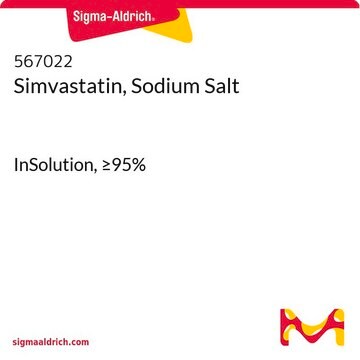M2537
Mevastatin
≥98% (HPLC), powder or crystals
Synonyme(s) :
Compactin, ML-236B
About This Item
Produits recommandés
Pureté
≥98% (HPLC)
Forme
powder or crystals
Couleur
white to light yellow
Pf
151 °C
Solubilité
ethanol: 25-26 mg/mL, clear, colorless
Spectre d'activité de l'antibiotique
neoplastics
Mode d’action
enzyme | inhibits
Auteur
Daiichi-Sankyo
Température de stockage
2-8°C
Chaîne SMILES
[H][C@]12[C@H](CCC=C1C=C[C@H](C)[C@@H]2CC[C@@H]3C[C@@H](O)CC(=O)O3)OC(=O)[C@@H](C)CC
InChI
1S/C23H34O5/c1-4-14(2)23(26)28-20-7-5-6-16-9-8-15(3)19(22(16)20)11-10-18-12-17(24)13-21(25)27-18/h6,8-9,14-15,17-20,22,24H,4-5,7,10-13H2,1-3H3/t14-,15-,17+,18+,19-,20-,22-/m0/s1
Clé InChI
AJLFOPYRIVGYMJ-INTXDZFKSA-N
Informations sur le gène
human ... HMGCL(3155) , HMGCR(3156)
rat ... Hmgcr(25675)
Vous recherchez des produits similaires ? Visite Guide de comparaison des produits
Description générale
Application
- to analyze its effects on chronic lymphocytic leukemia (CLL) cells by cytotoxic assay
- as a prenylation inhibitor to analyze its effects on human embryonic kidney (HEK) cells transfected with K-Ras
- as a statin agent to study its anti-cancer effect on human breast cancer cells and glioblastoma in vitro
Actions biochimiques/physiologiques
Caractéristiques et avantages
Conditionnement
Code de la classe de stockage
11 - Combustible Solids
Classe de danger pour l'eau (WGK)
WGK 3
Point d'éclair (°F)
Not applicable
Point d'éclair (°C)
Not applicable
Équipement de protection individuelle
Eyeshields, Gloves, type N95 (US)
Certificats d'analyse (COA)
Recherchez un Certificats d'analyse (COA) en saisissant le numéro de lot du produit. Les numéros de lot figurent sur l'étiquette du produit après les mots "Lot" ou "Batch".
Déjà en possession de ce produit ?
Retrouvez la documentation relative aux produits que vous avez récemment achetés dans la Bibliothèque de documents.
Les clients ont également consulté
Articles
Cholesterol synthesis regulation by dietary levels, LDL receptors control lipid-rich LDL particle transport in cells.
Cholesterol synthesis regulation by dietary levels, LDL receptors control lipid-rich LDL particle transport in cells.
Cholesterol synthesis regulation by dietary levels, LDL receptors control lipid-rich LDL particle transport in cells.
Cholesterol synthesis regulation by dietary levels, LDL receptors control lipid-rich LDL particle transport in cells.
Notre équipe de scientifiques dispose d'une expérience dans tous les secteurs de la recherche, notamment en sciences de la vie, science des matériaux, synthèse chimique, chromatographie, analyse et dans de nombreux autres domaines..
Contacter notre Service technique












